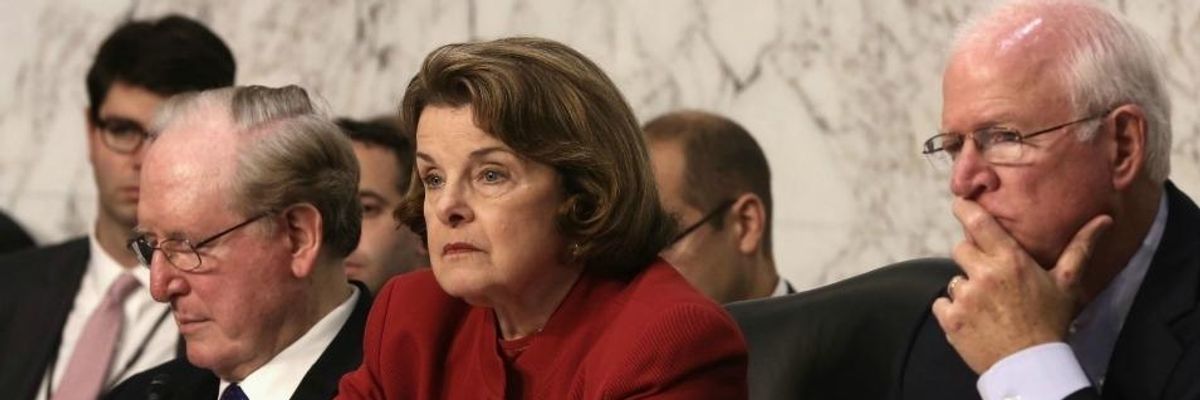When President Donald Trump first proposed a $54 billion increase in military spending, Democrats feigned outrage. Senate Minority Leader Chuck Schumer promised Democrats would "emphatically oppose" the domestic spending cuts needed to offset increased military spending, while House Democratic Leader Nancy Pelosi lambasted the proposal for "throwing billions of dollars at defense while ransacking" health, education and housing.
But when it came time in September to vote on the $700 billion National Defense Authorization Act, emphatic opposition somehow mutated into a bi-partisan military-industrial Summer of Love. Nearly every Senate Democrat, including Sens. Kamala Harris and Dianne Feinstein, not only failed to oppose Trump's proposal, they approved $26 billion more than he asked for and didn't even condition their votes on Republican support for the Restricting First Use of Nuclear Weapons Act.
Harris issued a celebratory news release praising the bill for "ensuring our brave service members have the equipment, support and benefits required to defend our nation." Her enthusiasm to squander billions on the war machine contradicts her support for social welfare initiatives with hefty price tags, including Medicare for All.
Unlike many of her colleagues, Harris is not on the defense industry's campaign payroll, though she no doubt has her share of lobbyists pressuring her to adhere to the pro-military Washington consensus. Even more troubling than the business-as-usual spectacle of corrupt politicians heeding their corporate donors is the phenomenon of politicians, like Harris, who either truly believe the military-industrial complex keeps us safe or, more cynically, believe that kowtowing to the Pentagon is a prerequisite for a successful career in Washington.
When we bloat the military year after year, it's only natural that we then call upon it to address conflicts that might otherwise have been simply ignored or defused via diplomacy. Every day, peace-promoting think tanks, like the Institute for Policy Studies, churn out intelligent white papers chock full of non-military conflict resolution strategies and, every day, Democrats and Republicans resolutely cover their ears and turn to the generals and war profiteers who have now delivered us to the brink of nuclear war.
In response to my concern, as her constituent, about nuclear brinkmanship in North Korea, Harris stated she shares my concern and sees military action as "a last resort ... to make the United States and our allies more secure." She went on to assure me that she "strongly supports the brave men and women of our military who stand at the ready to defend our national security interests."
Missing from Harris' carefully polished position statement is acknowledgment of what got us into this terrifying mess in the first place, the elephant (and the donkey) in the living room: U.S. aggression.
During the Korean War, the United States bombed and napalmed the living hell out of the north, killing 20 percent of the population. Though a cease-fire was declared in 1953, the U.S. maintains 35,000 troops in South Korea and 40,000 in Japan. It certainly has not escaped North Korea's notice that the U.S. still routinely invades and destroys nation-states deemed enemies and executes their leaders. As far as North Koreans are concerned, the war never ended, and Trump is sincere in his threat to destroy them. Their perception is far from crazy, much though politicians and pundits love to portray them as such.
American culture is so steeped in military veneration that we rarely pause to see our military actions from the perspective of other nations and to honestly assess whether the military-industrial complex, on the whole, does more harm than good. And by "rarely" I mean never.
Such willful blindness is what enables Democrats like Harris and Nancy Pelosi to conveniently forget that every dollar spent on nukes and drones and land mines and limb amputations is a dollar not spent on clean energy and affordable housing and public education and the opioid epidemic and a hundred other dire problems.
There's no shortage of ways in which $80 billion could be wisely spent, but further bloating an out-of-control military-industrial complex notorious for administrative waste, needless and non-functional weapons programs and imperial overreach is not one of them.
The Senate must still vote to appropriate the authorized $700 billion military budget, which means there's still time for concerned citizens to contact their members of Congress and remind them what war is good for. Absolutely nothing.




